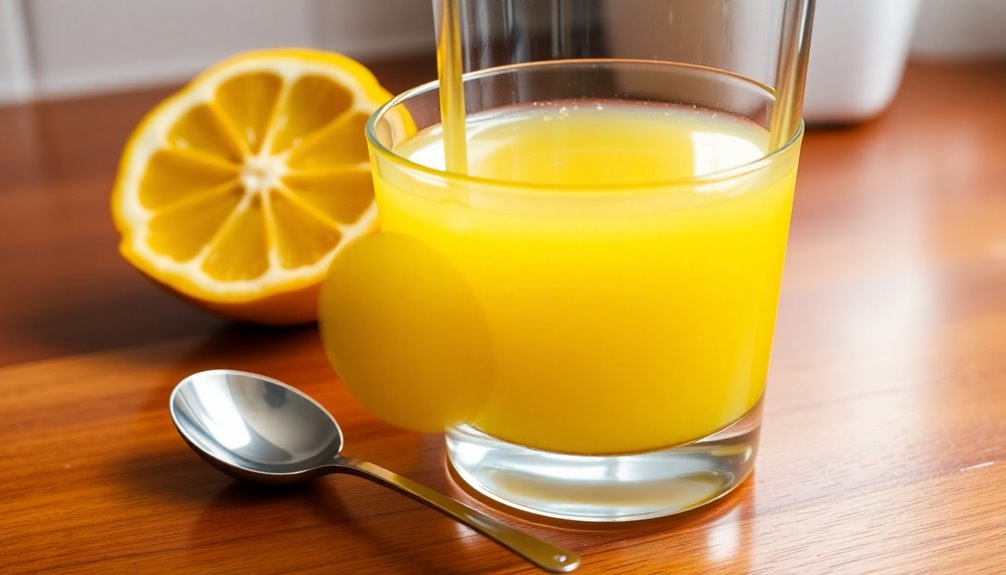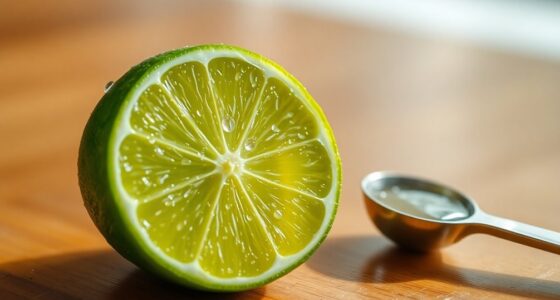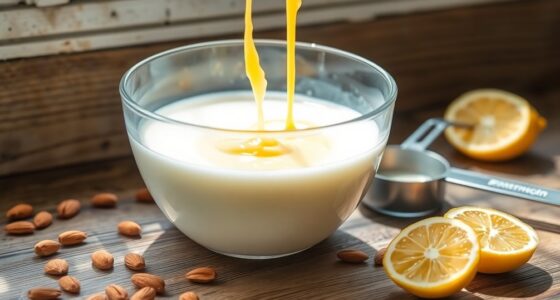If you need to substitute concentrated lemon juice for fresh lemon juice, remember that three tablespoons of concentrated juice equal the juice of one medium lemon. This is a handy conversion to keep in mind when you're cooking and fresh lemons aren't available. Just note that concentrated juice can have a stronger flavor, so you might want to adjust based on your taste preferences. Keep on exploring more tips to make the most of your lemon juice!
Key Takeaways
- One medium lemon yields about 2 to 3 tablespoons of fresh lemon juice.
- Three tablespoons of concentrated lemon juice equals the juice of one medium lemon.
- General rule: 1 tablespoon of concentrated juice equals 1 tablespoon of fresh juice.
- Product labels may vary, so check for specific conversion ratios.
- Adjust the amount based on taste, as concentrated juice can be stronger in flavor.

Ever wondered how much lemon juice you need when a recipe calls for one lemon? It's a common question, especially when you're in the middle of cooking and don't have fresh lemons on hand. Knowing the conversion between fresh lemon juice and concentrated lemon juice can save you time and hassle. So, let's break it down.
Typically, one medium lemon yields about 2 to 3 tablespoons of fresh lemon juice. This means if a recipe asks for the juice of one lemon, you can expect to squeeze out somewhere in that range.
But what if you're using concentrated lemon juice instead? That's where it gets interesting. For concentrated lemon juice, you'll find that 3 tablespoons of the concentrate equals the juice of about one medium lemon. This is a handy conversion to know, particularly when you're running low on fresh lemons.
When using concentrated lemon juice, it's crucial to check the product label for specific conversion ratios. While the general rule is that 1 tablespoon of concentrated lemon juice is equivalent to 1 tablespoon of fresh lemon juice, some brands might've variations. Always double-check to ensure you're getting the right flavor in your dish. After all, you want that fresh taste, even when you're using a concentrate.
Adjustments may be necessary based on personal taste preferences. Concentrated lemon juice can sometimes have a stronger flavor than fresh, so you might want to start with less and add more to taste. If you're accustomed to the vibrant zing of fresh lemons, concentrated lemon juice can catch you off guard with its intensity. It's a good practice to taste as you go, especially if you're unsure how much lemon juice you should add.
If you enjoy cooking with fresh lemons, you might find yourself reaching for them instead of the concentrate. There's something special about the aroma and flavor of freshly squeezed lemon juice that you just can't replicate with a bottle.
But when you’re in a pinch, or if you want to keep your kitchen stocked with a longer-lasting option, lemon juice concentrate can do the trick. It’s a convenient substitute that preserves the bright, zesty flavor of fresh lemons without the hassle of frequent shopping. If you’re unsure how to prepare lemon juice concentrate, it’s simple: just combine freshly squeezed lemon juice with a bit of water and store it in an airtight container. This way, you’ll always have a ready supply to enhance your dishes, cocktails, or even dressings!
Frequently Asked Questions
How Much Concentrated Lemon Juice Equals a Lemon?
When you're trying to figure out how much concentrated lemon juice equals a lemon, keep in mind that one medium lemon yields about 2 to 3 tablespoons of fresh juice.
Typically, that translates to roughly 3 to 4.5 tablespoons of concentrated juice. Always check the label for specific ratios, as they can vary.
It's a good idea to taste test, since the flavor strength might differ based on the brand you use.
Can You Use Bottled Lemon Juice in Place of Fresh Lemon Juice?
Yes, you can use bottled lemon juice in place of fresh lemon juice.
Just remember that one tablespoon of bottled lemon juice typically equals one tablespoon of fresh juice in recipes.
However, taste it first; concentrated lemon juice can be more acidic and have a stronger flavor.
If you want the vibrant taste and nutritional benefits, fresh lemon juice is the way to go, but bottled juice is perfect for convenience.
How Much Lemon Juice Is Equivalent to One Lemon?
When you're figuring out how much lemon juice equals one lemon, remember that a medium lemon usually gives you about 2 to 3 tablespoons of juice.
If you're using concentrated lemon juice, about 3 tablespoons should do the trick.
Keep in mind that fresh juice tastes brighter and more vibrant compared to concentrate, so if flavor's your priority, you might want to stick with fresh lemons when possible.
Is 100% Lemon Juice in a Bottle the Same as a Lemon?
Think of a lemon as a vibrant sunburst, offering bright flavor and zest.
When you reach for that bottle of 100% lemon juice, you're not quite holding the same radiant fruit. While it's made from real lemons, it's concentrated and can pack a stronger punch.
Conclusion
So, the next time you're in a pinch and think you need a fresh lemon, just reach for that bottle of lemon juice concentrate. Who would've thought that a little squeeze from a bottle could mimic nature's perfect fruit? It's almost like saying that a candle can replace the sun! But hey, when life hands you lemons—or rather, lemon juice—don't fret! You've got the zest of convenience right at your fingertips, even if it lacks that sunny charm.
Cindy thoroughly researches juicing trends, techniques, and recipes to provide readers with practical advice and inspiration. Her writing style is accessible, engaging, and designed to make complex concepts easy to understand. Cindy’s dedication to promoting the advantages of juicing shines through her work, empowering readers to make positive changes in their lives through the simple act of juicing.

















